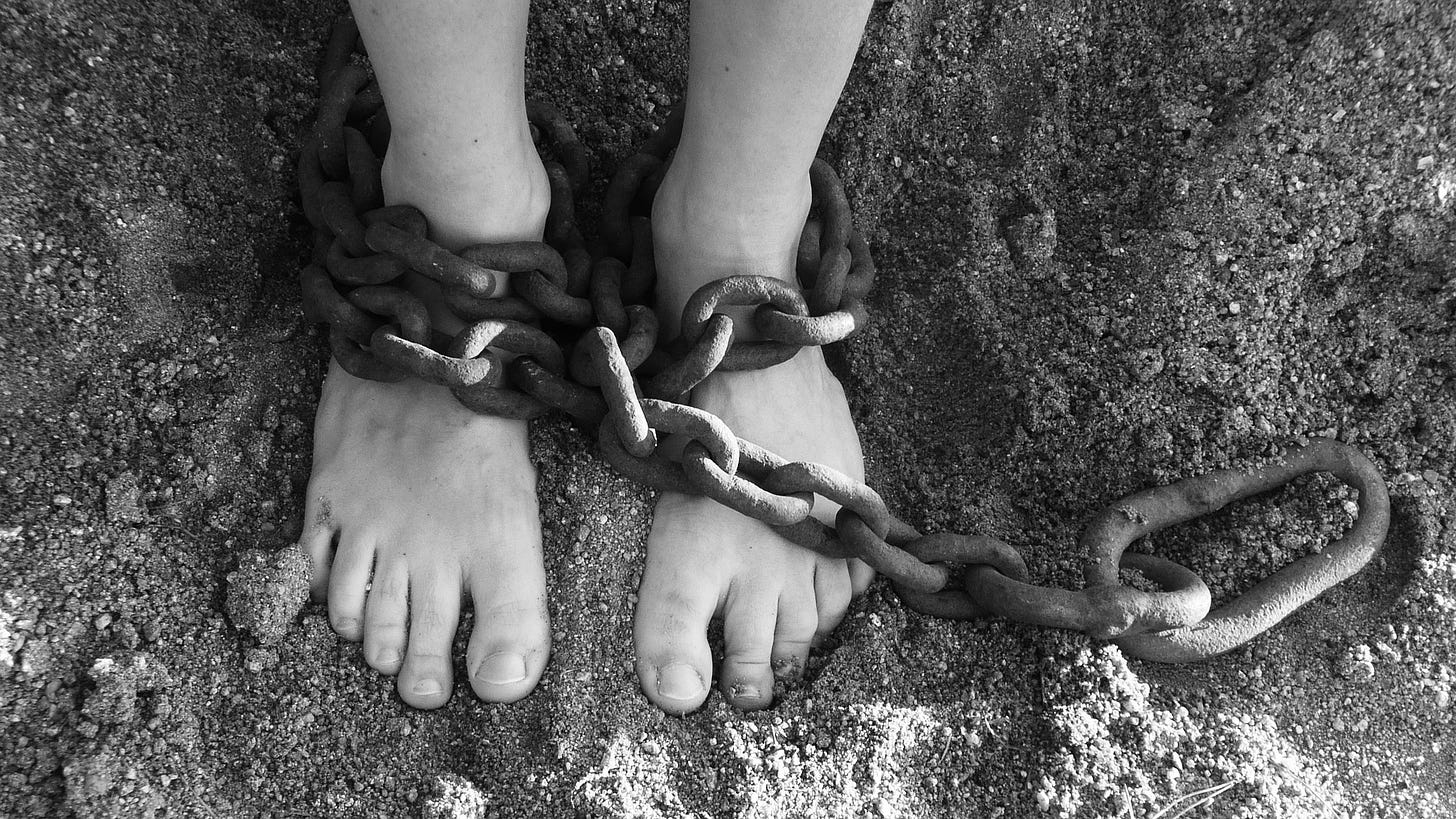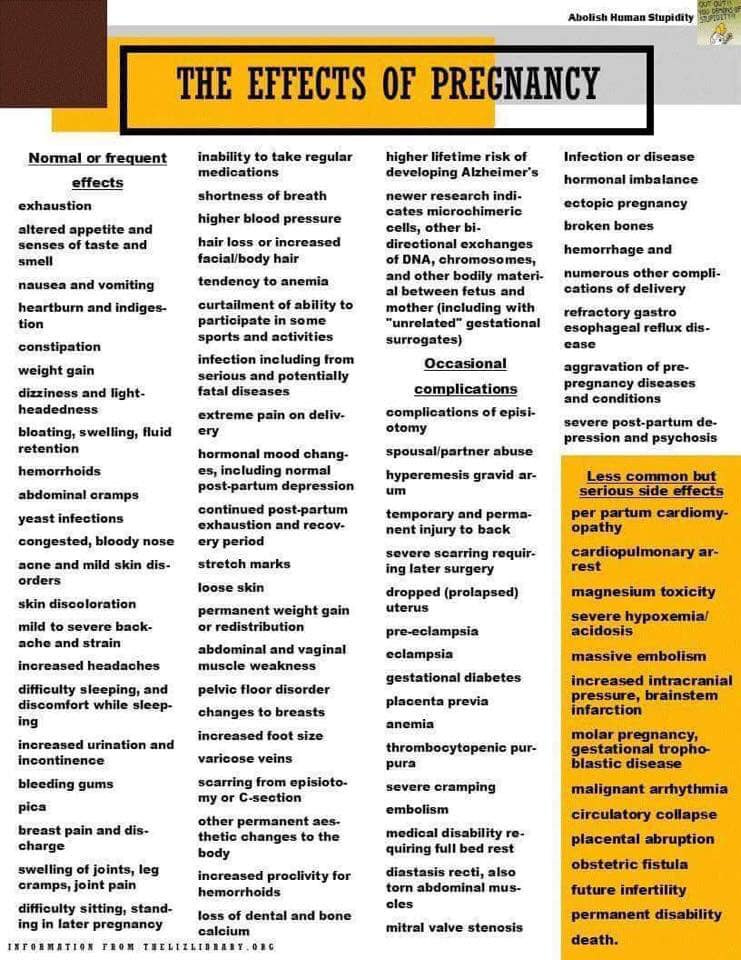
For decades a woman’s right to obtain an abortion has been defended with arguments such as fetal viability and families’ socioeconomic status: the pregnancy is just a “cluster of cells”; sometimes the fetus has a terminal illness, and causing a child a slow, painful death would be cruel; women seeking abortion may have other children they struggle to be able to feed. And all these are real problems that families face. But what if abortion access is necessary for a far more serious reason?
Several parts of the Constitution can be viewed as applicable to abortion rights, but here I will focus on its Thirteenth Amendment, which outlawed the American slave trade. The first section reads, "Neither slavery nor involuntary servitude, except as a punishment for crime whereof the party shall have been duly convicted, shall exist within the United States, or any place subject to their jurisdiction."
The nature of pregnancy dictates that if a woman cannot obtain an abortion, she has no choice but to carry the pregnancy to term and give birth. Hence, laws that ban abortion necessarily force the unwanted birth, and compel use of the woman’s body to that end. In what way is legally-mandated use of a living person’s body not forced servitude—literally, slavery?
Dissenters object that since pregnancy is a natural process, it cannot be forced. This disingenuously dodges the obvious: If there is a treatment for a biological condition, then even if another individual did not intentionally cause the condition to start, that person is forcing the other to undergo it if he or she deliberately blocks the treatment from being administered.
The argument has also been made that because pregnancy is natural, it must be benevolent, or ethical to force on unwilling persons. The numerous physical and psychological repercussions it can cause, including preeclampsia, nerve damage, and post-traumatic stress disorder, show that in fact, it is not an inherently moral process. Since I could not find a single source citing all other effects or possible effects of pregnancy and giving birth, for readers' convenience I have attached an image below listing some of them.
Nor does the presence of a human organ “intended” for a certain function justify forcing it to perform that function against the individual's consent. No person can have fewer or lesser human rights than another due to any inborn characteristic, including biological sex. Men undergo no such violent use of them as passive resources for others’ benefit, and doing so to them would be considered unconscionable, even it were done to dangerous offenders as restitution for their actions. Therefore, it is just as inhumane to compel use of a woman’s body in that invasive, degrading manner, especially for no other crime than having sexual intercourse and being female.
“But what about contraception?” Minus a hysterectomy, which removes the uterus, no form of contraception is fail-proof. No one should need to undergo major surgery to avoid a violation of her or his human rights. Furthermore, research has found that women’s uteri may be important for longevity and health in older age.
“But isn’t it hyperbolic or insensitive to compare pregnancy to enslavement?” Forced labor does not have a single form. It can manifest as compelled physical labor, as sexual servitude, as compelled organ harvesting, and it legally persists in the United States as reproductive servitude. All affect victims in ways different from the others; no one manifestation needs to be exactly like another, since in essence they all physically subjugate persons for others’ profit. To deny that women compelled to provide life to another with their own internal body parts are enslaved is to deny the severity of their oppression and block them from receiving justice.
As the Supreme Court reconsiders its previous ruling on Roe v. Wade, I have written a letter explaining why legislation that blocks abortion is unconstitutional, which readers can tailor to their needs. It restates some of the above points, with an emphasis on relevant constitutional amendments. Because SCOTUS’s email is for non-urgent matters, and there is no telephone line for comments from the public, please mail a hard copy as soon as possible. Even after the Court announces its decision, and if the ruling is not in women's favor, we must make our anger known. Roe may be ultimately overturned, but our fight will continue.
123 Maple Street
Anytown, ST 12345
Date
Chief Justice/Justice Surname
Supreme Court of the United States
1 First Street, NE
Washington, DC 20543
To Chief Justice/Justice Surname:
As the Supreme Court readdresses its 1973 ruling on Roe v. Wade, which affirmed a woman’s right to seek an abortion pre-fetal viability, I ask the Court to uphold its original decision. That decision is the groundwork of gender-based protections; removing those basic protections would fly in the face of the Constitution, American principles, and universal human rights.
The Court justified its decision on the grounds of the Fourteenth Amendment’s protection of life, liberty, and property, but other precedents provide stronger support. The Bill of Rights’ Fourth Amendment established that all citizens must be free from excessively intrusive searches and seizures, which abortion restrictions enable. If a human pregnancy has a right to life, then it follows that the pregnancy is a person, and for obvious reasons its rights would be much more invasive to guard than anyone else’s. Besides forcing unwilling pregnant women to carry to term, the State must assign pregnancies a legal identity, just as born humans have. Because damage to a pregnancy can be induced by environmental factors, certain substances, and physical impact to the mother, then if the fetus is born damaged or there is no live birth, the mother must be investigated for causing harm to a child, just as if the harm had occurred to a living child. One can imagine the measures the State would need to take against an individual’s body, property, and private home to determine whether she had committed a crime against her pregnancy.
Secondly, and most importantly, the Thirteenth Amendment reads, “Neither slavery nor involuntary servitude, except as a punishment for crime whereof the party shall have been duly convicted, shall exist within the United States, or any place subject to their jurisdiction.” Abortion restrictions necessarily compel pregnant women to give birth, or carry to term post-viability; women’s bodies—including their internal organs and their genitalia—are used by force and against their will to serve another’s interests, with consequences that vary from physical harm to post-traumatic stress disorder to death. This is enslavement in the literal sense.
Neither having sexual intercourse nor being female is a crime. Yet on the basis of their biological sex, innocent persons are subjugated to damaging servitude, an equivalent of which may not be done to any other person, even society’s most violent offenders.
Due to the fact that pregnancies may not have legally protected rights without overturning women’s own, the State does not “have an interest in protecting pre-natal life,” contrary to the Court’s opinion in Roe, but must protect its female citizens equally to all others, no matter their fertility status or progression of any medical condition.
We the American people expect that you will fulfill your duty to protect the rights codified by our Constitution, and granted by our inherent human worth and dignity. Thank you for your attention.
Respectfully,
Your Name




